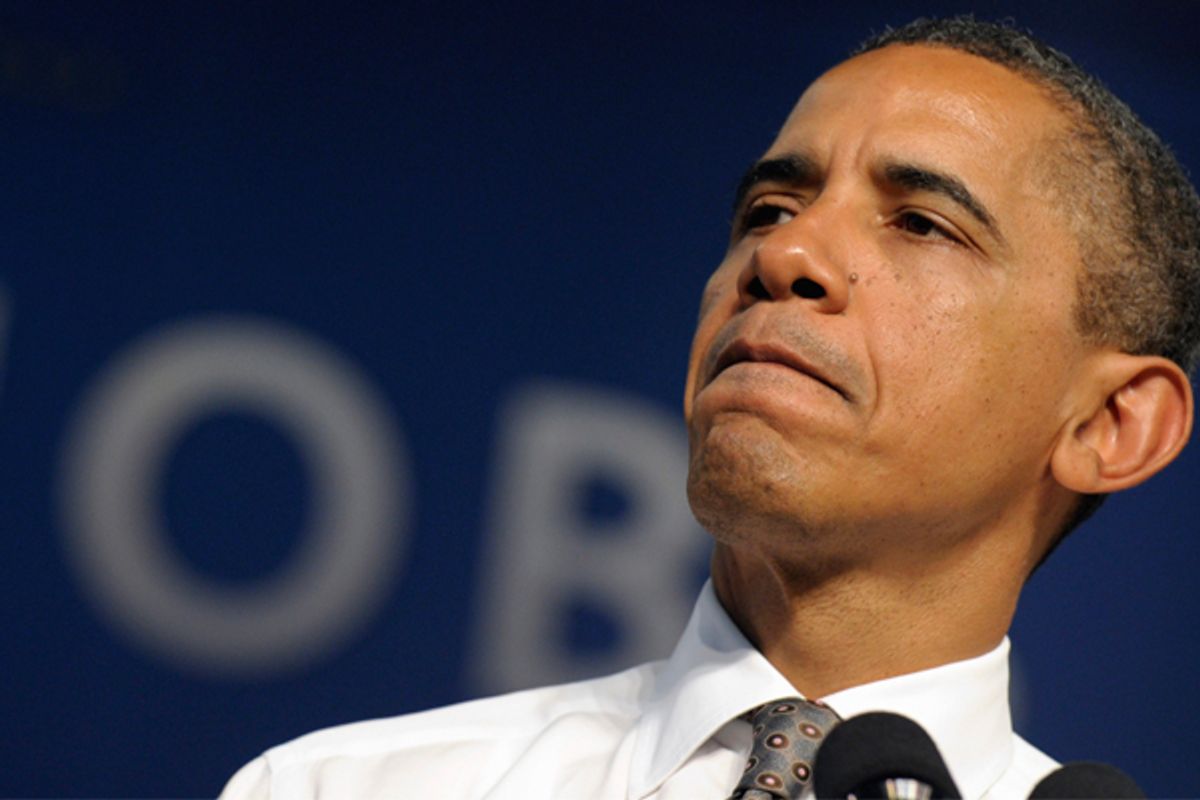The biggest secret that's not actually a secret in American politics is that President Obama realizes his $447 billion jobs bill will never be enacted -- and that, as a result, the economy will not benefit from the increased growth and expanded payrolls that economists agree it would produce in advance of the 2012 election. But he's pushing for it anyway, with unusual adamance and persistence, traveling the country to plead his case for an up/down vote in Congress and directly calling out GOP House leaders for refusing to give him one.
In the movie version, Obama's push would rally the masses, force the GOP to deal in good faith, and spur the enactment of a Big Plan that jolts the economy to life and restores the public's faith in Washington. The real-life reality, though, is that Republicans simply aren't going to back away from their absolute opposition to new stimulus spending in any meaningful way. At most, as House Majority Leader Eric Cantor indicated earlier this week, they may be willing to pass only a few of the most modest components of Obama's plan. There's just no reason for them to change course, not with Obama's approval rating now barely over 40 percent -- and not with the relationship between a president's reelection prospects and the state of the economy so well-established.
This is why, as I wrote when he unveiled it a month ago, Obama's jobs plan is really more of a reelection plan, one that stems from the White House's realization after the debt ceiling fight that playing the Great Compromiser would not lead to actual compromises with Republicans and would not save Obama with swing voters in 2012 as long as the economy remained rotten. Since then, Obama has shifted his posture noticeably, with an eye toward sharply delineating the basic philosophical differences between him and his Republican opponents. The hope is to capitalize on the one good thing for Obama that came out of the debt ceiling saga -- polls showing the image of the Republican Party slipping to its lowest level in the modern era -- by convincing Americans that radical Republican obstructionism is keeping him from enacting ideas they like.
The jobs crusade is a big part of this. In theory, it should be simple: The individual components of the plan are all popular when pollsters ask about them (even among Republicans). But, of course, it's not that easy -- public opinion can be maddening to interpret, with voters frequently expressing contradictory views. Saying they support specific ideas in Obama's jobs plan doesn't necessarily mean they will support Barack Obama's Jobs Plan. And even if they do say they support Obama's plan, it doesn't mean they'll alter their overall judgment on his performance as president and his handling of the economy.
Thus do polls continue to show Obama in perilous territory: A new CBS survey has his job approval at 44 percent, while ABC pegs it at 42. When it comes to moving public opinion in a significant way, a miserable economy imposes profound constraints on a president. It's tough to get around the public's bottom-line desire to hold the White House occupant accountable for their anxiety.
But this doesn't mean Obama's strategy is foolish. It just means that if he's going to break through to the public in this climate, it will be around the margins; there's really nothing he can say or propose that will lift his job approval to 60 percent. But the 2012 election will probably be won or lost on the margins, with a swing of a point or two in either direction potentially making the difference. Obama right now is in real danger of being defeated for reelection, but he's also capable of winning a second term. That's the promise of the jobs push. Obama is making it clear that he's going to make this his priority for the foreseeable future.
And there are some subtle signs that he might be reaching at least a few people. On the question of whom they trust more on job creation, voters now prefer Obama by a 49-34 percent spread, according to the new ABC poll. And a recent CBS poll found that 53 percent of voters believe that Obama simply doesn't have the power to do anything about the economy. This is potentially significant when you compare it to 1992, the last time a president was defeated for reelection because of the economy. That fall, 59 percent of Americans said that George H.W. Bush could do something to fix the economy. Granted, a big part of the difference is probably the public recognition that the economy is in a much deeper hole right now. But it may also be that some voters have been persuaded that Republican obstructionism has tied Obama's hands.
And there are other areas where Obama is seeking to draw clear contrasts with the GOP, most notably his renewed push for higher taxes on the wealthy -- another concept that polls very well on its own, even among Republicans. There's no illusion on the White House's part that this will restore Obama's standing to where it was in the early days of his presidency. But if it boosts him by just a few points -- or if it leads 1 or 2 percent of the electorate to decide next year that the GOP is too risky an alternative to four more years of Obama -- then it could easily save him from being a one-termer.



Shares